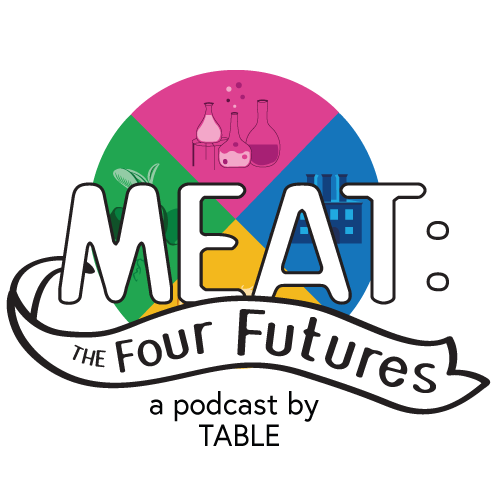
Mural at the Better Meat Co facility
Episode summary
What do some entrepreneurs, venture capitalists, animal activists, and environmentalists have in common? They each envision a future where meat alternatives can tackle the environmental impacts and animal suffering caused by global livestock production.
But in this futuristic vision of replacing livestock with plant-based substitutes and cultivating meat in labs from animal cells - are we living in a utopia or a dystopia?
We speak with scientists, investors, and CEOs from across the world to better understand the motivations, scientific basis, and evidence that either support or raise concerns about the future of alternative 'meat'.
Listen to each part

Part 1 - The Why (12 minutes)
We hear what motivates Paul Shapiro, CEO of The Better Meat Co, Steve Jurvetson, co-founder of Future Ventures, and Isha Datar, executive director of New Harvest, to build this alternative meat future including reducing the environmental impact and animal suffering caused by industrial animal production.

Part 2 - Meeting the global demand with meat alternatives (8 minutes)
We ask Hakeem Jimo, CEO of Veggie Victory, Varun Deshpande, Managing director at Good Food Institute India, and Nicole Rocque, Senior innovation specialist at Good Food Institute India, what role alternative proteins could play in feeding the Global South, particularly in Africa and Asia, where both incomes and populations are on the rise?

Part 3 - The What (7 minutes)
Paul Shapiro and Isha Datar talk about the differences between plant-based, fungi-based and cell-based meat alternative. We also go into the details of how each of these food technologies start with plants, proteins and cells, and end up as food on your plate.

Part 4 - What we know and what don't we know (11 minutes)
Raychel Santo, researcher at the Center for a Livable Future, helps us understand the environmental impacts, the animal welfare concerns and nutritional value of these plant- and cell-based meat alternatives.
Agricultural economist Jayson Lusk joins us again to tell us who is actually eating these products.

Part 5 - Different roads to a 2050 alternative meat future (9 minutes)
Steve Jurvetson, Paul Shapiro, Jan Dutkiewicz and Isha Datar each describe their vision of an alternative meat future and talk about the role of public and private investment in making that a reality.
Scientific articles and related resources
Part 1 - The what
Ted Talk: Harnessing fungi to create a climate of change in the meat world (Paul Shapiro, 2022)
Ted Talk: How we could eat real meat without harming animals (Isha Datar, 2021)
Book: Clean Meat: How Growing Meat Without Animals Will Revolutionize Dinner and the World (Paul Shapiro, 2018)
Part 2 - Meeting the global demand with meat alternatives
Tapping Smart Protein's Potential (Varun Desphande, 2022)
A Deep Dive into the Early Adopters for Plant-based Meat in India (Good Food Institute, 2022)
Feeding India: The case for smart protein (Nicole Rocque, 2021)
Part 3 - The what
Podcast: Are Plant-and Fungus-Based Fake Meats Really Better Than the Real Thing? (Gastropod, 2021)
Part 4 - What we know and what we don't know
Considering plant-based meat substitutes and cell-based meats: A public health and food systems perspective (Raychel Santo et al, 2020)
Deep dive: Cultivated meat cell culture media (Good Food Institute)
FDA Completes First Pre-Market Consultation for Human Food Made Using Animal Cell Culture Technology (US FDA, 2022)
Part 5 - Different roads to a 2050 alternative meat future
Cultured Meat Needs a Race to Mission, Not a Race to Market (Dwayne Holmes et al., 2022)
JBS to acquire cultivated meat company in $100m investment (Ag Funder News, 2021)

